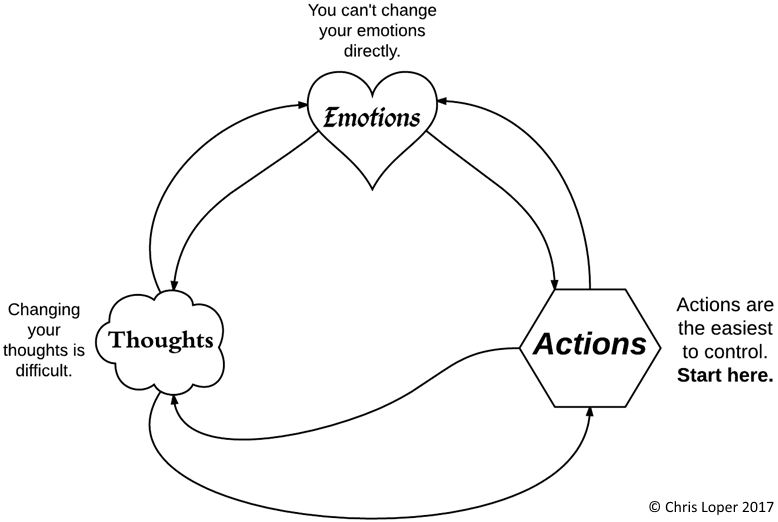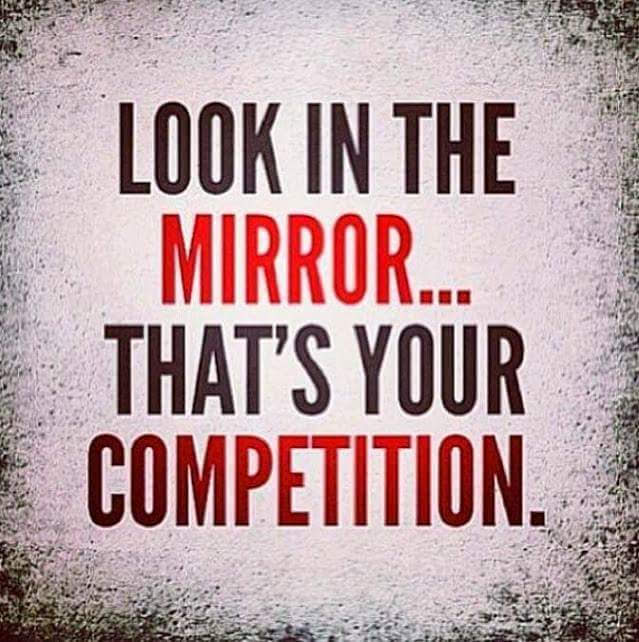You are a control freak!”
How many times have you heard this expression thrown at someone for whatever reason?
This cultural phrase has a built-in pejorative connotation to the notion of control. It makes us feel as if seeking to control things is unhealthy or exclusively associated with freaks.
So let’s debunk this idea, should we?
Seeking Control is built-in into Us
We love feeling in control of things: Whether it is our environment, ourselves, our lives, other people: Whenever we are in control of something, we feel a profound sense of Power, we feel ourselves able to influence and change things, and that satisfies a deep instinctual need that we share with all other animals: The ability to control what’s happening in order to ensure our survival.
In fact, being able to control their surroundings and environment made a big difference for our ancestors on whether or not they were able to survive. If you want to avoid to be eaten by Lions and other creatures, you have to learn to master your environment and be in control.
Obviously, the groups of humans who were seeking to have control had more chances of survival than other groups who did not care, and hence, this key characteristic was passed on to us from one generation to the next by the group of people who survived across time: The control freaks!
But You Can’t Control Everything
Now, we’ve seen that seeking control is a deeply seated instinctual need that we have. Therefore, the next logical step is to try to satisfy and fulfill this need.
But the thing is, we can’t control everything. And most people’s misery comes from trying to control what they cannot control.
So part of developing into a mature and healthy human being is to learn to differentiate between what you can and cannot control, and to focus your attention on the things you have control over.
So what can we control?
8 Things We Can Control
1. The Present
Our minds live in three temporal dimensions: The past, the present, and the future.
And out of these three times, the present is the only one we can control.
The Past is gone, and we cannot change it or manipulate it. All we can do is learn from it.
The future is a fictive time that has not come yet. We can plan for it, imagine how it could be, but we can never know for sure whether or not it will turn out the way we want.
But the Present is happening right now, it is what you do with your time at this moment.
You are in total control of this temporal dimension, you can directly manipulate the present, you can choose to do action X, or Y, you can change things, you can build empires, you can make it or break it, something that you cannot do with the past and future.

Therefore, focusing most of our attention on the present time and what we can do with it instead of whining about the past or dreaming the future is essential if we want to be masters of our lives.
2. Our Interpretations Of Events
Random events that we have nothing or little to do with happen to us all the time: A baby crying on the seat next to you on the plane, A car accident on our way to work, a lay-down at our job, a partner who leaves you.
Now, we have to come to terms with the fact that we cannot control these random events, and it would be futile to do so. The only thing we can do is to first accept them, and then consciously choose our interpretation of these events to move forward.
In other words, even though we cannot control these events, we can still control our interpretations and the meaning we assign to these events, and that’s where our freedom lies.
Example: Your life partner leaves you for whatever reason
Interpretation 1:
- I lost the person I love the most on Earth
- It’s all my fault, I’m such a loser
- I need to fix this and I wish we’ll get back to together
Now, this is one of the default interpretations that someone might have after their partner leaves them. This way of thinking would result in deep sadness and sorrow, constant pain, extreme guilt and anxiety.
Although it’s normal to feel this way and grieve after a break up, after some point, we have to move on, and once we realise we are in control of the meaning we assign to events, we can choose to shift our interpretation of this break up to a more helpful one:
Interpretation 2:
- This break up has been the best learning opportunity of my life
- This is an opportunity to learn more about relationships and review what went wrong in order to get better at it
- This break up is a chance to spend more time and connect with myself, relearn who I am, and realign my life with my values and the things I care about.
- Objectively, the relationship would have never worked given the dynamic we had. Therefore, breaking up was the right decision.
Now, with this new interpretation, we are able to press the pause button on our lives: We channel those painful emotions in a productive way to think through things, learn from our experiences, and grow.
A shift in our interpretation of events can be the difference between ending up you life depressed and growing into a mature healthy human being, and that completely depends on us and the choices we make.
3. Our Actions and Reactions
One of the building blocks of Cognitive Behavioral Therapy is the CBT Model describing the relationship between our Thoughts, Emotions, and Actions.

At the most rudimentary level, our thoughts and interpretations influence our emotions, our emotions influence our actions, and our actions influence our thoughts.
So How do we consciously manipulate this loop in order to improve our overall psychological health?
By focusing on the component on which we have most control: Our Actions.
See, we might not be able to directly control our emotions, but we are always in control of the actions and reactions that we undertake once we feel a certain emotion.
Feeling Anxious in a social situation? You can still choose whether you go and talk to that person or not, regardless of how you feel.
Feeling depressed? You can still choose whether you plunge in endless distractions, go ahead and commit suicide, or focus on finding solutions to improve your life.
Feeling in Love but within a toxic relationship? You can still choose whether you continue being in that relationship or break up, regardless of the intense love you are feeling.
In other words, your emotions don’t have to fully control or dictate your actions. You can let yourself feel your emotions however you want, but at the end of the day, you are in total control (and hence 100% responsible) of the actions you choose to undertake, regardless of how you feel.
4. Our Choices And What We Do With Our Limited Time On Earth
We always get to choose what to do, at any given point in time. And the sum of these choices make up our entire lives and who we become in this world.
External events that we have nothing to do with and still affect us are always there. It’s a constant. However, we get to choose how to react and which direction to take after being impacted by these events.
Or as Jean-Paul Sartre puts it:
“Freedom is what you do with what’s been done to you”
J.P Sartre
In other words, you are always in control of your life, no matter what happens to you, because you always get to choose what to do with what happens to you.
5. Who You Compare Yourself To
Comparing ourselves to others is deeply rooted in our nature: We automatically compare ourselves to other people because we want to make sure we are still good enough, we still fit in well in our environment and we are not left behind.
Why? Again, it all comes back to the survival needs of our ancestors: Those who didn’t make sure they were fitting in within the tribe and who were left behind were eaten by lions, and hence we (current human beings) didn’t get much of their “I don’t give a damn” genes.
However, when you compare yourself to other people, you are comparing yourself to something that is totally outside of your control: You cannot choose who these people are, how they think, what type of personality they have, what experiences they’ve lived in the past, what do they care about and what they don’t.
All these factors are outside of your control, and when you evaluate your worth on the basis of a comparison with something totally outside of your control (other people), well, you are given away the keys of your emotional stability to whichever passer-by or random social encounter you make.
Not a great strategy. So what’s the alternative?
Comparing Yourself Today To Who You Were Yesterday
See, there are two components to this comparison: Who you are right now, and what you compare yourself to.
When you compare yourself to who you were yesterday, you are in total control of both sides of the equation: You are in control of you choose to become today, but you are also in control and responsible for who you were yesterday.
Who you were yesterday is based upon the choices you made in the past, choices that were within your control. So when you stack up who you are right now against your older self, you feel that change and growth is within your grasp: You don’t feel helpless because you are comparing yourself to a random stranger totally unrelated to you with a totally different story of which you probably know nothing about, but you feel empowered and in control of the situation because you are comparing yourself to something tangible that you completely own and know: Yourself.

6. The Efforts You Put In
You control the efforts you put in, not the results.
Therefore, if you want to feel in control of your life, you should learn to value the efforts and work you put in more than the results themselves.
Because more often than not, the results you have in life depend on many other variables that are totally outside of your control, and there is not much you can do about it. You can, however, focus on what is within your reach, which is, the amount of efforts that you put in.
Your definition of “success” needs to shift from:
- “Yes! I got the results I wanted!” To “Yes! I purred my heart and soul into what I do”
And your definition of “failure” should change from:
- “Shit! I didn’t reach the results I wanted” To “Damn, I did not put enough efforts”.
That’s when you will be valuing what’s in your control: Your efforts.
7. Your Attention
Have you ever noticed that there is something called your “attention”?
This is not your thoughts, your feelings, your actions, none of this. And no, you do not have to become a Buddhist monk to be able to manipulate and choose where you place your attention.
You see, things happen in the world, both in your external world (whatever is happening in your direct accessible environment) and your internal world (your mind producing some thoughts, emotions are taking place inside of you, etc).
You cannot control most of these events, your mind is a thought chat box that you can hardly shut down, you cannot directly control your emotions, and most of what’s happening out there in the world is outside your grasp.
However, you do control to a great degree, which of these things you choose to focus on.
In other words, where you place your attention is something that you own:
- You don’t like something that’s happening right in front of you and that you cannot control? You can accept the event as it is and put your attention on something else.
- Your mind is producing an infinite amount of negative thoughts that you can’t seem to battle against and win? You can just accept these and then choose to direct your attention elsewhere.
Your attention is a powerful tool within your control that can make you or break you, so learn to use it wisely.
8. What Being Successful Means To You
Is being successful in today’s world equivalent to becoming filthy rich and popular? If that’s the case, is today’s definition of success the same as it was 500 years ago? Probably not, because there is no absolute definition of success whatsoever.
In fact, within a given society at a given time, success is defined by how much you satisfy the values preached by your culture.
For instance, in our globalized culture, values such as profit, money, and fame are highly regarded, and therefore, individuals who fulfill this set of values are considered successful by others.
However, once you free yourself from the need of being accepted by others and become more self-aware, you come to realize that:
“Wait, I can choose what I want to value in this world, and not necessarily automatically incorporate whatever values are preached in my environment and have them as my own. I can choose my own values, and hence, I can have my own definition of success”
Once you grasp the fact that you are free to choose and go after what you want to value in this world, you will have set your own definition of success: Being successful now means to you that you satisfy the standards and values you have set for yourself, whatever they happen to be.
Success is no longer something outside of your reach that the world has defined for you and that you have no control over. Success is something that you have defined yourself based on your own values, it’s something meaningful and personal, that you get to choose.
Dividing everything that happens in your journey into two sets “Things in my control” and “Things not in my control” and focusing on the first set is one of the best intellectual methods of fulfilling your instinctual need of being in control.
When you approach life from this angle, you take an active and dominant approach towards your existence: You feel powerful and self-confident when facing the immensity and complexity of this world, because you know that whatever happens, you are still the chief commander of your actions, your decisions, your interpretations, and your values.
You start to see that, ultimately, how much you focus on these things you have control over determine the level of Freedom you allow yourself to live by and breath.
You realise that, your Freedom, one of the keys to your personal fulfillment, was right here, inside of you, but you just weren’t looking.
It’s calling for you, from the deepest abyss of your soul, and all you have to do, is to answer the call.
Stay in the loop


